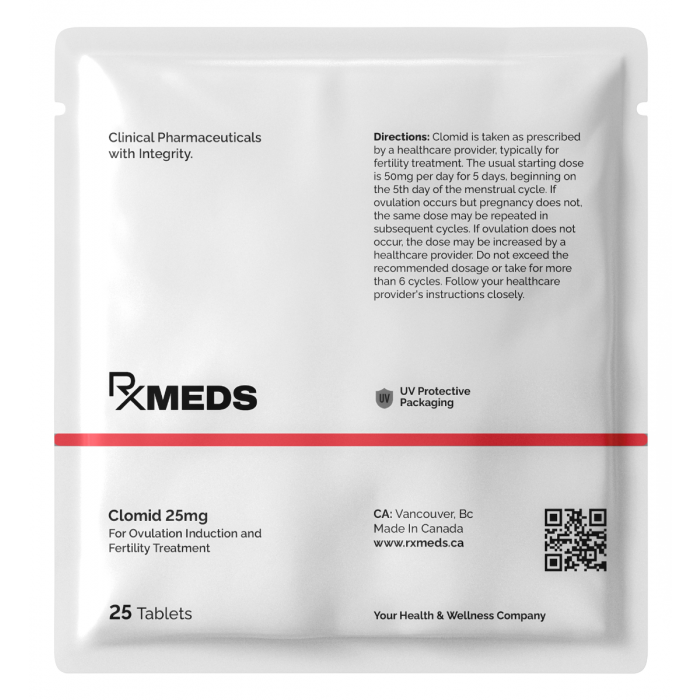 |
|
5 Customer Review
I’m thrilled with the results of this product! My Metformin arrived incredibly fast, the discreet packaging was perfect!
Checkout using your account
Checkout as a new customer
Creating an account has many benefits:

In stock
Clomid is a non-steroidal medication used in fertility treatments. It stimulates the pituitary gland to release hormones necessary for ovulation, the process of releasing an egg from the ovary.
This medication is prescribed to induce ovulation in women who have specific medical conditions, such as polycystic ovary syndrome, that inhibit natural ovulation. Additionally, Clomid may be used for other purposes not listed in this guide.
Do not use Clomid if you are pregnant.
Clomid should not be used if you have:
Do not use Clomid if you are allergic to clomiphene citrate, or if you have:
Inform your doctor if you have:
Clomid can pass into breast milk and may affect a nursing baby. It might also reduce milk production. Discuss with your doctor if you are breastfeeding.
Using Clomid for more than 3 cycles might increase the risk of ovarian tumors. Consult your doctor about your specific risks.
Fertility treatments may raise the likelihood of multiple births, which pose higher risks for both the mother and babies. Address any concerns with your healthcare provider.
Use Clomid exactly as directed by your physician. Follow all instructions on your prescription label, and do not take more or less of the medication than recommended.
Typically, Clomid is taken for 5 days, starting on the 5th day of your menstrual cycle. Your doctor will guide you on the precise timing and dosage.
Undergo a pelvic examination before each treatment cycle and stay under your doctor’s care while using Clomid.
Ovulation generally occurs within 5 to 10 days after starting Clomid. For the best chance of pregnancy, engage in sexual intercourse during ovulation.
Your doctor might ask you to track your basal body temperature to predict ovulation timing. Most patients should not use Clomid for more than 3 treatment cycles. If ovulation occurs but pregnancy does not follow after 3 cycles, your doctor may reevaluate your infertility treatment.
Store Clomid at room temperature, away from moisture, heat, and light.
Contact your doctor for guidance if you miss a dose of Clomid.
In case of an overdose, seek emergency medical assistance or call the Poison Help line at 1-800-222-1222.
Clomid may cause blurred vision. Use caution when performing tasks requiring clear vision and alertness.
Seek immediate medical help if you experience signs of an allergic reaction to Clomid, such as:
Some women may develop ovarian hyperstimulation syndrome (OHSS), especially after the first treatment. OHSS can be severe and requires immediate medical attention if symptoms such as:
Discontinue Clomid and contact your doctor if you have:
Common side effects include:
This is not an exhaustive list of side effects. For further medical advice, contact your healthcare provider. Report any side effects to the FDA at 1-800-FDA-1088.
Typical Adult Dose for Ovulation Induction:
Usual Adult Dose for Lactation Suppression:
Usual Adult Dose for Oligospermia:
Clomid may interact with other drugs, including prescription, over-the-counter medications, vitamins, and herbal products. Inform all your healthcare providers about the medications you are currently using or plan to use.
Was this page helpful?
Keep all medications out of children's reach, never share your medicines, and use Clomid only as prescribed by your healthcare provider.
Always consult your healthcare provider to ensure this information applies to your individual health circumstances.